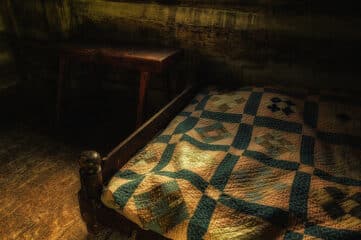The Power of a Number
I.
He wonders, now that she is long gone like another Spokane sunset, how the Property of Inequality even comes into play since their love tied them together like an ellipse ( … ). He knows enough to know that an ellipse means to go on forever.
Before it all broke, she whispered to him, Forever and ever.
Their bodies naked and tangled, Forever and ever, she said like a song.
Forever, he said to her, an echo.
And ever, he says to himself, an echo to his echo.
II.
What he comes up with, as he scribbles late at night on butcher paper, is that she and he are binaries—a set with just two numbers. The next morning, as he takes up two tables at the coffee shop, he realizes they are Zeros and ones, zeros and ones, he mutters to himself.
As dusk sinks into dark and even the Spokane River becomes little more than a black path to the stars, he is alone.
III.
After she doesn’t return any of his eighteen phone messages, after she doesn’t reply to a single letter he sends, he realizes she loves him less than nothing. He knows his negative numbers but wonders if this is mathematically possible.
IV.
He tries again, this time solving for an inequality, which means he must reverse the order of the inequality.
After he has removed every picture of the two of them from his wall, after he has washed every sheet until her scent is gone, after he throws away everything she’s given him over their months, he begins again.
This time he never says he loves her first.
This time, even though she isn’t even around to leave, he never says, Stay. Please.
This time he waits until she says, I need you.
V.
As he wanders over to her new apartment up on the south hill, he realizes—through the math and through her movements (the way she kisses her new lover, her tongue dangling in this boy’s mouth)—that they (he and she) were just skew lines.
He knows the math well enough. Skew lines, never parallel, never intersecting.
He tries to wrap his mind around that—never parallel, never intersecting.
VI.
This time after another night without sleep, he counts his fingers the times he’s failed. He counts again, a different number. Another time, another number.
Running out of fingers, out of his mind, he tries the Power of a Number, which is found by multiplying a number by itself one or more times.
It doesn’t take long to discover that 1 x 1 always = 1.
Since he can’t change himself from 1, he can never get anything to = 2.
VII.
He looks at the papers before him, covered in equations.
He looks at the sky above, blackened out by formulas.
He looks at the photo of her—alone, in this photo, and smiling so broadly—and whispers, I am an empty set, an empty set; we are so far past an endpoint.
Holding Fog
The night is windless, the slivered moon as still as dawn love. Her words float as if they are nothing more than an autumn fog above a glassy river. He tries to hold onto them all. (Like every other time, he tries.) But no one can hold fog.
A deep-hulled rowboat scrapes the shore, down and up and down with the placid current. The boat, with rusted oarlocks, remains tied to an elm (that has withstood this river’s seven biggest floods). Some things can stand forever it seems.
After midnight he is in the big bed dreaming (or swimming and searching). His dreams: there are no leaves, not on a single tree. Nothing to hide her but still no way to find her. How can emptiness, nothingness, swallow so much of his life?
The cabin stands empty save for the red table and two chairs (and the hard autumn air). He sits at the table, his hands in his lap. The one chair is unmoved for months. He looks at the chair, he looks out the window. He wonders, Where do the seasons go? Where does a life go?
Outside—decomposing logs scatter on the hillside. Deer paths through the woods. The lean-to where they picnicked that night. Remember, he asks the walls of the cabin, the cobwebs in the corners. The walls seem to swallow his words.
Too late, I realize that I could have told her quiet things. Beautiful things. Things like all the other things. She’s gone seven years (and never said goodbye). That night, the night she went for a late-night swim, she never said a word and neither did I.
–
Sean Prentiss is the editor of a forthcoming anthology on the craft of creative nonfiction. This book, The Far Edges of the Fourth Genre, is being published by Michigan State University Press. His essays, poems, and stories have appeared in Brevity, Sycamore Review, Passages North, ISLE, Ascent, River Styx, Spoon River, Nimrod, and many other journals. His essays have won Honorable Mention in The Atlantic Monthly’s Graduate Student Writing Contest and won Fugue’s nonfiction contest, and he has been awarded the Albert J. Colton Fellowship for Projects of National or International Scope.
Lead image: “Bed and Bench” (via Flickr user Donnie Nunley)

